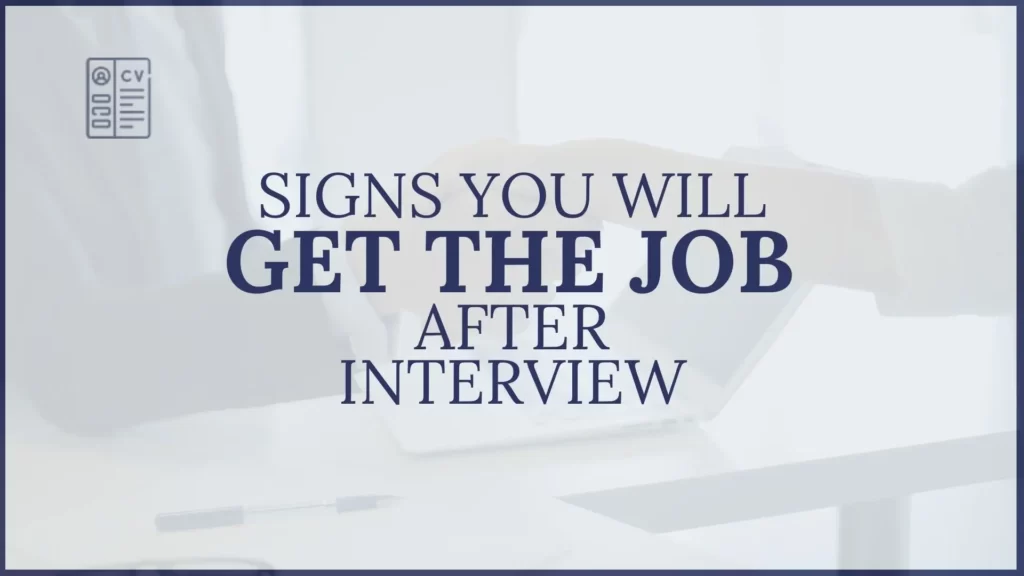Are you eagerly waiting to find out if you aced your interview and are on the verge of landing your dream job? While the waiting period can be nerve-wracking, there are certain signs that can indicate whether or not you will get the job. From the positive body language of the interviewer to the enthusiastic tone of the conversation, there are many clues that can give you a good idea of your chances. In this blog post, we will walk you through the key indicators that suggest the signs that you will get the job after interview so you can put your mind at ease and look forward to your new role.
Key Takeaways:
- Positive non-verbal cues: Pay attention to the interviewer’s body language and tone. If they display positive non-verbal cues, such as leaning in, nodding, and maintaining eye contact, it can be a sign that you will get the job.
- Discussion of next steps: If the interviewer discusses the next steps in the hiring process, such as salary negotiation, start date, or onboarding, it indicates that they are considering you for the position.
- Positive feedback and enthusiasm: If the interviewer provides positive feedback and expresses enthusiasm about your fit for the role, it is a strong indicator that you will likely receive a job offer.
Analyzing the Interviewer’s Body Language
Some interviewers may not reveal much about their thoughts or feelings through their words, but their body language can speak volumes. By carefully analyzing the interviewer’s nonverbal cues, you can gain valuable insight into how the interview is going and your chances of landing the job.

Positive Nonverbal Cues
During the interview, pay close attention to the interviewer’s body language for signs of positivity. Smiling, nodding, and maintaining eye contact are all positive indicators that the interviewer is engaged and interested in what you have to say. Additionally, open and welcoming gestures such as leaning forward, uncrossed arms, and a relaxed posture can signal that the interviewer is receptive to your answers and overall impression. These nonverbal cues suggest that you are making a positive impression and that the interviewer is considering you as a strong candidate for the position.
Negative Nonverbal Cues
On the other hand, there are nonverbal cues that could indicate a less favorable outcome. Avoiding eye contact, frowning, and crossed arms can be signs that the interviewer is unconvinced or uninterested in your responses. Similarly, restless or impatient movements such as tapping fingers, fidgeting, or looking at the clock may indicate that the interviewer is not fully engaged or may be ready to conclude the interview. These negative nonverbal cues could suggest that the interview is not going well and that you may not be the top candidate for the job.
Reflecting on the Interview Content
The interview is a critical moment in the job application process, and it’s important to reflect on the content of the interview to gauge your performance and the overall atmosphere of the meeting. Reflecting on the interview content can provide valuable insight into whether you will likely get the job or not.

The Depth of the Questions Asked
During the interview, pay attention to the depth and complexity of the questions asked by the interviewer. Challenging and thought-provoking questions often indicate that the company is interested in getting to know you on a deeper level and is considering you for the position seriously. If the questions delved into your experience, skills, and how you would handle specific scenarios, it’s a positive sign that the interviewer sees potential in you and is envisioning you in the role.
Your Responses and Their Reactions
Another aspect to consider is the nature of your responses to the interview questions and the reactions of the interviewers. Confident and articulate responses from your end, coupled with positive body language and engagement from the interviewers, are good indicators that you made a strong impression during the interview. If the interviewers seemed pleased with your answers and displayed enthusiasm whether its an interview on a call or a virtually taken interview, it’s a sign that you connected well with the interview panel and left a favorable impression. Additionally, if they discussed next steps or provided a timeframe for a decision during the interview, it’s a positive indication that they are considering you for the position.
Post-Interview Indicators
To determine whether you will get the job after the interview, it’s essential to pay attention to the indicators that follow the interview. These indicators can provide valuable insight into the likelihood of being offered the position. Here are some factors to consider as you evaluate the post-interview stage.

Communication after the Interview
After the interview, it’s important to pay attention to the communication you receive from the company. If they reach out to you promptly to express their appreciation for your time and to provide any additional information, it’s a positive sign. Furthermore, if they follow up with you to schedule a second interview or discuss next steps, it indicates that they are interested in moving forward with your application. On the other hand, if you don’t receive any follow-up communication within a reasonable timeframe, it may be a cause for concern.
Time Frame and Next Steps Discussion
During the interview, the hiring manager may have provided you with a general time frame for the decision-making process and the next steps in the hiring process. If they mentioned a specific timeline for when they plan to make a decision or indicated what the next steps would be, it’s a positive indicator. It demonstrates that they have a clear plan in place and are actively moving forward with the hiring process. Conversely, if there was no discussion about the next steps or the timeline for a decision, it may indicate a lack of organization or a potential delay in the process.
By paying attention to these post-interview indicators, you can gain a better understanding of your standing in the hiring process and make informed decisions about your next steps. Remember that while these indicators can provide valuable insights, they are not definitive guarantees of whether you will ultimately get the job. Nevertheless, staying attuned to these signs can help you navigate the post-interview stage with confidence and clarity.
Assessing the Overall Experience
After the interview, it’s essential to take some time to reflect on the overall experience. This involves assessing various aspects of the interview process to gauge whether you are likely to get the job. There are certain signs and characteristics that can indicate a positive outcome.
Gauging the Environment and Culture Fit
One important factor to consider is the environment and culture fit during the interview. Take note of the overall atmosphere in the office, how employees interact with each other, and the general vibe of the workplace. Positive signs to look out for include friendly and welcoming staff, a sense of teamwork, and a company culture that aligns with your values. On the other hand, red flags may include a tense atmosphere, lack of enthusiasm among employees, or a culture that doesn’t match your work style or values.
Your Gut Feeling Post-Interview
Another crucial aspect to consider is your gut feeling after the interview. Your instincts can often provide valuable insights into whether you will get the job. If you left the interview feeling confident, positive, and excited about the prospect of working for the company, it’s likely that the interview went well. However, if you have a lingering sense of doubt, unease, or dissatisfaction, it may be a sign that this job is not the right fit for you.
Conclusion for Signs You Will Get the Job After Interview
From above signs and indicators, it is clear that you have a strong chance of getting the job after the interview. Your positive interaction with the interviewer, the length of the interview, and the interviewer’s enthusiasm all point towards a favorable outcome. Additionally, being shown around the workplace and discussing future steps are positive indicators. Your preparedness, relevant experience, and engaging questions further solidify your chances of receiving an offer. Remember, these signs are not definitive guarantees, but they do bode well for your prospects. So, stay positive and keep your fingers crossed until you receive that official job offer.
People Also Asks – Signs You Will Get the Job After Interview
What are signs that indicate I will get the job after an interview?
Signs such as positive body language from the interviewer, a discussion of salary and benefits, and being introduced to potential colleagues can indicate that you will likely get the job.
Is it a good sign if the interviewer mentions future plans for the company and position?
Yes, if the interviewer discusses the company’s future plans and how the position fits into those plans, it is a positive sign that you may get the job.
What are positive indicators during the interview that suggest I will be hired?
Positive indicators include the interviewer expressing enthusiasm about your qualifications, being asked about your availability to start, and discussing specific onboarding processes.
Should I be optimistic if the interviewer asks for my references or background check information?
Yes, if the interviewer requests your references or background check information, it is a strong indication that you are being seriously considered for the position.
Are there certain phrases or language used by interviewers that signify a strong chance of being hired?
Yes, phrases like “when you join our team” or “we look forward to having you on board” can indicate a high likelihood of being offered the job after the interview.

